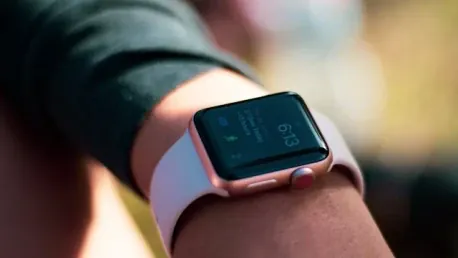Fitness trackers, recognized as a burgeoning $62 billion industry expected to grow by 21% by 2032, have significantly transitioned from niche scientific tools to mainstream consumer health devices. As the technology has evolved, today’s fitness trackers offer a sophisticated range of functionalities beyond the simple clip-on pedometers and wristbands of yesteryear. These modern devices track an array of metrics including steps taken, heart rate, sleep quality, oxygen levels, and even stress and fertility. This leads to a pertinent question: Do fitness trackers genuinely aid in improving fitness, or do they contribute to data overload?
The Evolution of Fitness Trackers
Fitness trackers have come a long way from their humble beginnings. Initially, they were simple devices that counted steps and offered basic activity data. Today, they are equipped with advanced sensors and algorithms that can monitor a wide range of health metrics. This evolution has made them popular among fitness enthusiasts and casual users alike, fundamentally changing how individuals approach their health and fitness routines.
Modern fitness trackers can measure heart rate, sleep patterns, oxygen levels, and even stress and fertility, providing users with a comprehensive view of their health and fitness. The ability to track such a wide array of metrics allows individuals to make informed decisions about their lifestyle and exercise routines. For example, someone might adjust their sleep habits based on the data provided by their tracker, leading to better overall health. These features have made fitness trackers indispensable for many people who seek to gain a deeper understanding of their bodily functions.
More advanced models even offer personalized training and recovery coaching based on physiological data trends, helping users optimize their fitness routines. This means that instead of following a generic workout plan, individuals can receive tailored advice that suits their specific needs, ensuring more effective workouts and better results. The constant advancements in technology have made these devices not just tools for tracking but integral components of modern fitness regimens.
Benefits of Using Fitness Trackers
The consensus among experts is that fitness trackers can be effective tools when applied correctly. They provide real-time data regarding bodily responses to exercise, effectively serving as digital workout companions. These devices also act as motivational tools by holding users accountable to their fitness goals through constant monitoring and feedback. For instance, setting a daily step goal can encourage users to be more active throughout the day, promoting a healthier lifestyle.
Clinical psychology student and strength instructor Sara Swaneck credited her fitness trackers for helping her stay committed while training for a HYROX competition. The devices encouraged her to meet her daily exercise goals and allowed her to tailor her workouts based on sleep and recovery data. This personalized feedback can be crucial for individuals looking to optimize their fitness routines, as it provides insights into how their bodies respond to different types of exercise and rest.
Fitness trackers also assist in tracking progress toward health and performance goals, facilitating behavior regulation. Trends over time can be monitored to verify the effectiveness of workouts, ensuring positive impacts on physiology such as calories burned and resting heart rate patterns. Advanced models even offer personalized training and recovery coaching based on physiological data trends, thus optimizing long-term healthy habits. By using the data to make informed decisions, individuals can adjust their routines to achieve better results and maintain their motivation.
Drawbacks and Limitations
However, fitness trackers are not without their drawbacks. They are not medical-grade devices, leading to occasional inaccuracies, particularly in metrics like calorie expenditure and sleep times. These discrepancies can mislead users regarding their recovery and training protocols. For instance, an overestimation of calories burned might lead someone to consume more food than necessary, hindering their weight loss goals. Similarly, inaccurate sleep data might result in misconceptions about one’s sleep quality, affecting overall well-being.
Additionally, fitness trackers predominantly focus on cardiovascular data, often neglecting important elements like strength and muscle mass, which are crucial components of overall health. While tracking steps and heart rate can provide useful information, it does not give a complete picture of an individual’s fitness level. The extensive data provided by these devices can also be overwhelming and distracting without a clear guiding goal or training plan. Users may find themselves fixated on numbers and metrics rather than focusing on the quality of their workouts and overall well-being.
The potential for data overload is another significant drawback. With so much information available at their fingertips, some users may become obsessed with tracking every aspect of their health, leading to stress and anxiety. The constant monitoring can also create an unhealthy fixation on achieving specific metrics rather than enjoying the physical activity itself. It’s essential to strike a balance between utilizing the data for improvement and not becoming overly reliant on the tracker.
Choosing the Right Fitness Tracker
Determining whether to use a fitness tracker depends on individual needs and preferences. Prospective users should assess which metrics are important for their health and fitness goals and consider whether data tracking motivates them. For example, setting a daily step goal could encourage extra physical activity, while tracking sleep and recovery data could aid in performance adjustments and overall well-being. Understanding one’s specific requirements is crucial in selecting the most suitable device.
Recognizing how the device fits into one’s lifestyle, including comfort and practicality concerns, is also crucial. Users should be wary of the potential for data overwhelm or an unhealthy fixation on metrics. It’s important to choose a tracker that feels comfortable to wear throughout the day, as an uncomfortable device may deter consistent usage. Additionally, considering factors like battery life, screen readability, and ease of use can further enhance the overall experience.
Choosing the right fitness tracker involves considering one’s goals, desired features, and budget. While higher-priced models often offer more comprehensive data and additional functionalities like smart notifications and GPS, simpler and cheaper models may suffice for basic tracking needs. Ultimately, fitness trackers can be significant investments, but for those motivated by data and who integrate tracking into their fitness plans, these wearables can be valuable tools. It’s essential to strike a balance between functionality and affordability to find a device that meets individual needs without breaking the bank.
Integrating Fitness Trackers into Daily Life
Fitness trackers, now part of a booming $62 billion industry projected to grow by 21% by 2032, have come a long way from their origins as specialized scientific instruments. Once just basic clip-on pedometers or simple wristbands, today’s fitness trackers are advanced pieces of technology geared towards mainstream consumers. Modern fitness trackers boast a variety of features that far surpass the old models. They can monitor steps taken, heart rate, sleep quality, oxygen levels, stress, and even fertility.
These devices promise to help users enhance their health and fitness by providing real-time data that encourages more physical activity and better health habits. However, this raises an important question: do these fitness trackers effectively improve fitness, or do they simply result in an overwhelming amount of data that users might find hard to interpret?
With the influx of health metrics, some users might feel motivated to push themselves towards healthier lifestyles. At the same time, others may find the constant stream of information to be more of a burden than a benefit. Fitness trackers have the potential to revolutionize personal health management, but it’s essential to assess whether they truly improve fitness outcomes or if they just contribute to information overload. This debate points to a larger issue within the tech and health sectors: creating devices that genuinely foster improvement without overwhelming users with excessive data.









